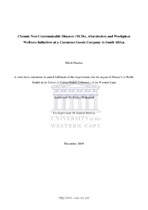| dc.contributor.advisor | Mohamed, Suraya | |
| dc.contributor.advisor | Mchiza, Zandile | |
| dc.contributor.author | Maseko, Mbali | |
| dc.date.accessioned | 2020-12-02T11:25:30Z | |
| dc.date.available | 2020-12-02T11:25:30Z | |
| dc.date.issued | 2019 | |
| dc.identifier.uri | http://hdl.handle.net/11394/7636 | |
| dc.description | Master of Public Health - MPH | en_US |
| dc.description.abstract | Non-communicable diseases (NCDs) are the leading causes of deaths worldwide and
are shown to be responsible for approximately 71% of deaths globally. NCDs mainly affect
individuals of working age, resulting in high sick leave absences and loss of productivity in the
working environment. This presents a major barrier to economic growth, particularly in low- and
middle-income countries where the impact is greatest. Among the interventions identified in the
South African Strategic Plan for the control of NCDs, is the implementation of wellness initiatives
(i.e. diet and exercise interventions) in the workplace. This has been to improve overall productivity
and decrease absenteeism. This study was therefore aimed at investigating the effect that participating
in workplace wellness initiatives targeted at employees, particularly those that are overweight,
hypertensive and diabetic at Nestlé, had on the number of working days lost due to sick leave from
NCDs. | en_US |
| dc.language.iso | en | en_US |
| dc.publisher | University of Western Cape | en_US |
| dc.subject | South Africa | en_US |
| dc.subject | Non-communicable diseases | en_US |
| dc.subject | Deaths | en_US |
| dc.subject | Workers wellness | en_US |
| dc.subject | Economic growth | en_US |
| dc.title | Chronic non-communicable diseases (ncds), absenteeism and workplace wellness initiatives at a consumer goods company in South Africa | en_US |
| dc.rights.holder | University of Western Cape | en_US |

